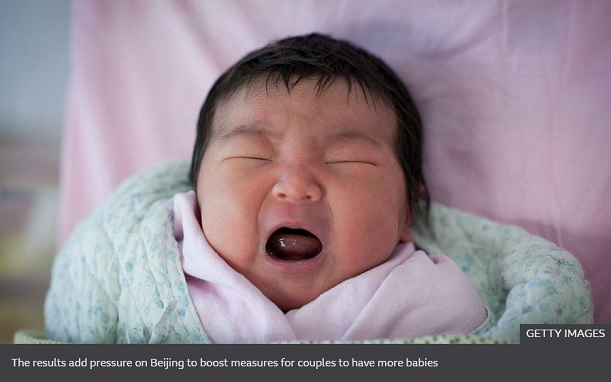
China's population grew at its slowest pace in decades, according to government data released on Tuesday.
The average annual growth rate was 0.53% over the past 10 years, down from a rate of 0.57% between 2000 and 2010 - bringing the population to 1.41bn.
The results add pressure on Beijing to boost measures for couples to have more babies and avert a population decline.
The results were announced in a once-a-decade census, which was originally expected to be released in April.
The census was conducted in late 2020 where some seven million census takers had gone door-to-door to collect information from Chinese households.
Given the sheer number of people surveyed, it is considered the most comprehensive resource on China's population, which is important for future planning.
What do we know about China's birth rate?
Ning Jizhe, head of the National Bureau of Statistics revealed that 12 million babies were born last year - a significant decrease from the 18 million newborns in 2016.
However he added that it was "still a considerable number".
Mr Ning added that a lower fertility rate is a natural result of China's social and economic development.
As countries become more developed, birth rates tend to fall due to education or other priorities such as careers.
Its neighbouring countries Japan and South Korea, for example, have also seen birth rates fall to record lows in recent years despite various government incentives for couples to have more children.
Last year, South Korea recorded more deaths than births for the first time in history, raising fresh alarm in a country which already has the world's lowest birth rate.
Shrinking populations are problematic due to the inverted age structure, with more old people than the young.
When that happens, there won't be enough workers in the future to support the elderly, and there may be an increased demand for health and social care.
Hasn't China already been trying to improve this?
Yes. In 2016, the government ended a controversial one-child policy and allowed couples to have two children.
But the reform failed to reverse the country's falling birth rate despite a two-year increase immediately afterwards.
Ms Yue Su, principal economist from The Economist Intelligence Unit, said: "While the second-child policy had a positive impact on the birth rate, it proved short-term in nature."
There had been expectations that China might scrap the family planning policy altogether along with the new census results, but this did not happen.
A report by the Financial Times earlier this April also quoted people familiar with the matter as saying the census would reveal a population decline.
This did not happen with the 2020 report but experts have told various media outlets that it could still happen over the next few years.
"It will in 2021 or 2022, or very soon," Huang Wenzhang, a demography expert at the Centre for China and Globalisation told Reuters.

